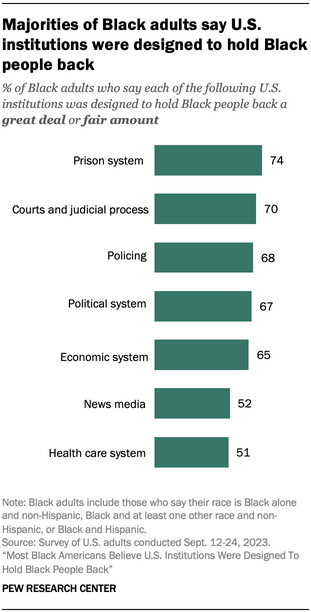
New Afrikan National Consciousness Alive

Our movement sees the contradiction between internal semi-colonies (New Afrikan/Black Nation, First Nations, Chican@s, Puerto Ricans, Hawaiins) and the Amerikan oppressor nation as the principal contradiction in the United $tates. In practice that means if we want change, we need to push this contradiction to its conclusion. However, in the years that MIM(Prisons) has existed, we’ve seen that contradiction to be at a relatively low level, historically speaking.(1) Since we don’t have things like armed struggle today to assure us of this contradiction, a recent Pew Research study provides us with some reassurance that the national consciousness of New Afrika is alive and well.(2)
The survey showed that 74 out of 100 Black people in the United $tates believed the prison system was designed to hold Black people back. It asked this question for numerous state institutions, with slightly lower levels of agreement. Another question in the survey showed 69% of respondents feel that being Black is important to how they feel about themselves. The latter question demonstrates a level of national consciousness, even if most respondents would call it “race”. The distrust in the U.$. government places this national consciousness in conflict with Amerika and its institutions.
It’s worth noting that the results were pretty consistent along demographics of age, income, education, sex. The biggest predictor for not agreeing that the government is holding Black people back is being a Republican – but even then the majority agreed.
This survey got more attention in the press because it was originally framed as demonstrating that most “Black Americans” believe “racial conspiracy theories.” Pew Research responded by amending the language in the report, and they provide historical examples of the U.$. state using these institutions against Black people. To view such beliefs as conspiracy theories is obviously telling.
MIM(Prisons) of course upholds the belief that the U.$. prison system exists to hold back and repress the internal semi-colonies and control the population in general. It is part of the system of maintaining national, class and gender oppression. Interestingly the survey also showed 74% of Black people believing, “Black people are disproportionately incarcerated so prisons can make money.” This, as we’ve discussed extensively, is mostly a myth. It might be harsh to call it a conspiracy theory, since everything under capitalism is about money on some level. But we believe the question of whether people are imprisoned for profit, or for social control, is an important question for understanding the system and how to combat it.
The importance of surveys like this from Pew Research is scientifically investigating our conditions. Despite the fact that Pew went into this survey with some clear bias around the relationship of Black people to the United $tates, their resources allowed them to survey thousands of people across demographics to give them 95% confidence that their numbers are within plus or minus 2%. While MIM(Prisons) has done a number of surveys over the years, even our best did not have such tight confidence intervals. And to date our surveys have been limited to prisoners, who are also mostly male. Therefore bourgeois-funded surveys and government statistics are an important part of our scientific investigation of our conditions. Transforming this latent national consciousness in New Afrika into action is where revolutionary practice must come in and deepen our knowledge of our conditions.
Notes:
1. see MC5,
March 1999, On the Internal Class Structures of the Internal
Semi-Colonies for analysis of the modern relationship between the
oppressed and oppressor nations in the United States.
2. Pew
Research Center, June 2024, “Most Black Americans Believe U.S.
Institutions Were Designed To Hold Black People
Back”
Related Articles:








